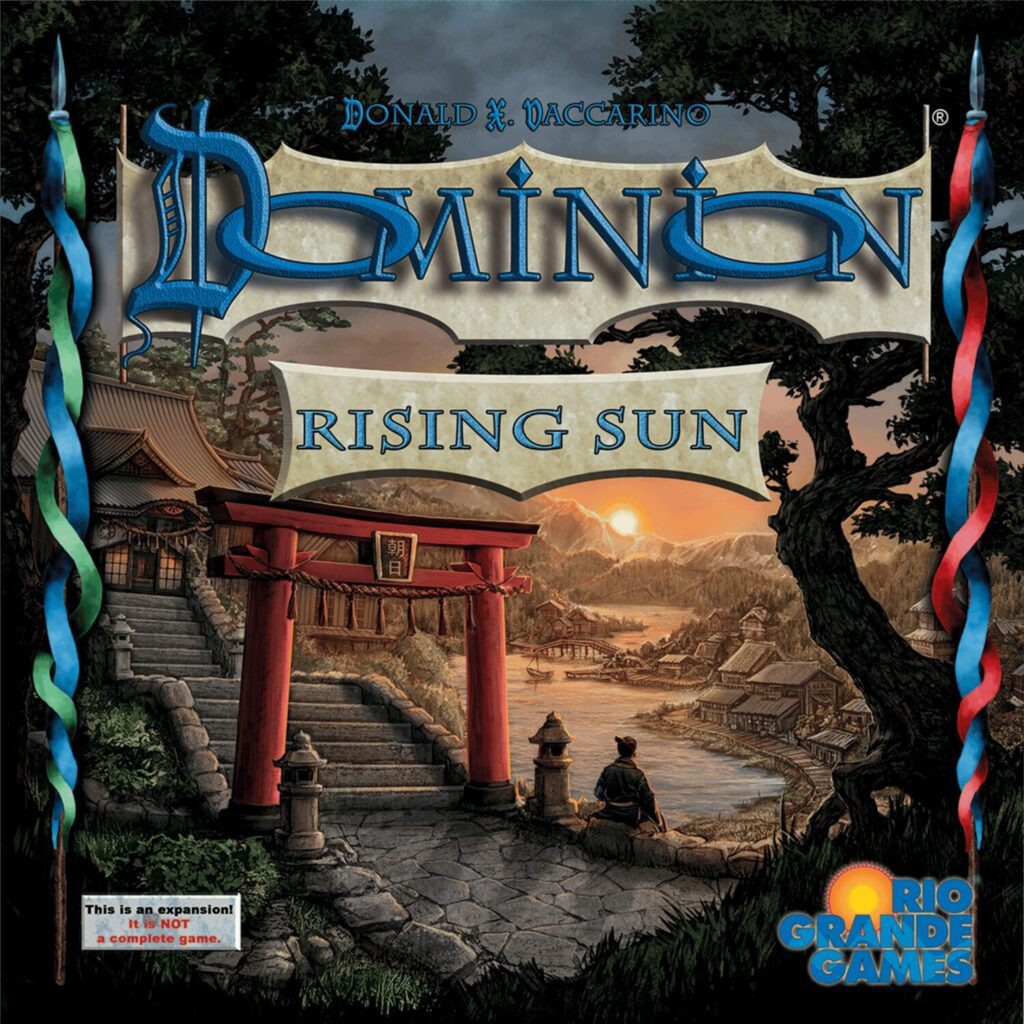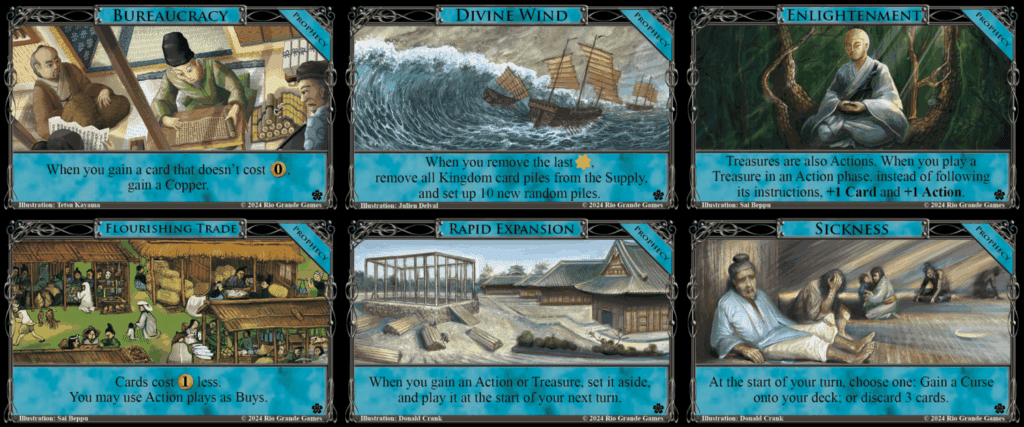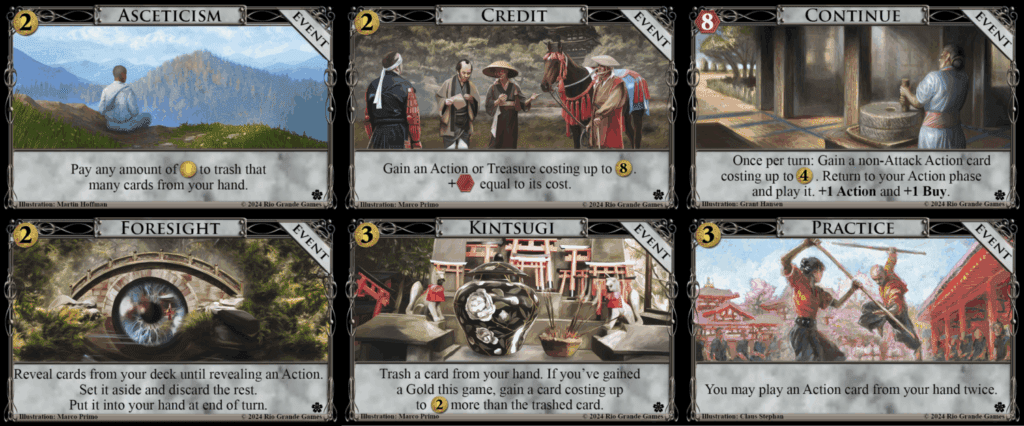Disclosure: Meeple Mountain received a free copy of this product in exchange for an honest, unbiased review. This review is not intended to be an endorsement.
Dominion is the ancestor of all deck-building games, still a giant in the tabletop arena almost twenty years after it was released. Check out our review of the base game and our Dominion strategy guide!
Dominion also has plenty of expansions to explore, with the sixteenth released in 2024. In this series, Meeple Mountain examines them all to determine which is the greatest. In each article, we’ll introduce an expansion, put forward the motion that it deserves to be recognised as the greatest of all Dominion expansions, offer a rebuttal for why it isn’t the greatest and then deliver our verdict.
This time – Rising Sun!
What does it add?
Some new things and some things we’ve seen before. We’ll start with the old.
Durations! Only two new Duration cards but Durations are plentiful in the Dominion ecosystem, particularly after 2022’s Plunder. Of the two, Samurai is notable since after an initial attack it then provides a coin every turn for the rest of the game.
Events! Like Durations, it’s now customary for expansions to have new Events. Rising Sun adds another 10, bringing the total pool to 79. All bar one add no additional rules other than being effects that you pay for on your turn (the other Event involves Debt).

Debt! Previously only seen in 2016’s superb Empires, Debt is revisited with a twist. As with Empires, there are three cards you can buy by taking on Debt, which has to be paid off before you can buy anything else. What’s new are six cards that incur Debt when you play them or react to Debt that you already have.
Prophecies and Omens – new territory! Prophecies are Rising Sun’s addition to the growing selection of Landscape card types, and add new rules that, when triggered, impact the entire game. All are game-changing, to a greater or lesser degree. The Omen symbol appears on six Kingdom cards and acts as a timer for the Prophecy to be activated.
Shadows! The final addition involves five Shadow cards. When shuffling, these are placed on the bottom of your deck and are an Action card that you can retrieve and play as if it was in your hand.
Why is Rising Sun the Greatest?
Feudal Japan! Dominion’s link between theme and mechanics has always been subtle (although very much present), and it’s nice to see the series move beyond the very Western setting that the base game and all previous expansions have covered. Even previous highpoints of diversity (Hinterlands and Plunder being the best examples) seemed to treat anywhere beyond Europe as foreign lands or ‘exotic’. Rising Sun grounds the game firmly in its location, rather than somewhere different to be travelled to. There isn’t a European face on any of the cards, and that’s to be praised. It’s helped by at least some of the artists involved being Japanese (although not as many as was originally intended).
Rising Sun also excels in how it plays. Recent expansions have either been a bit dour and/or forgettable (looking at you, Allies and Menagerie) or have tripped over themselves in their efforts to please (yes, we know you have lots of Treasure Plunder). Playing Plunder it didn’t matter what I did; I just had to turn up and the game rewarded me with goodies. Rising Sun isn’t as obviously generous, taking more of a give-you-the-tools than give-you-the-rewards approach. You earn your own fun with Rising Sun, but it’s in an accessible way – this isn’t Dominion hard-mode.

And what a joy it is to see Donald X. Vaccarino revisiting Debt, that cost-reward balance is delightfully teasing. Getting a powerful card in the first couple of turns by going into Debt feels like a refreshed approach to the standard early game. And those cards that give you a little Debt when you play them are often fairly powerful and make going into Debt oh-so-tempting.
There’s only one new Treasure card – Rising Sun is the anti-thesis to Plunder – but they aren’t missed. So many of the Kingdom cards give you money or help you buy things that Treasure isn’t a big deal here. In fact, I can’t recall a set where I’ve bought so few Treasure cards, or as many times that I’ve not bothered buying any Treasure cards at all. A turn might start with you in the black, see you going into debt as you play cards, and still provide enough routes to allow you to pay off that debt and make a big purchase or two, without you playing a single Silver, Gold or Platinum.
The Action cards in Rising Sun are just interesting and useful, and whilst there are only four that don’t involve Debt, Omens or Shadows, those headline mechanics don’t detract or overwhelm. They also work well as a set and when mixed with other expansions, not something you can say about all Dominion expansions that can sometimes need more of their own to thrive (Nocturne or Alchemy) or flood everything else (Seaside or Plunder).
Whilst the Omen cards act as timers for the Prophecies, they’re otherwise normal Kingdom cards that work well with other cards in the set. The Shadow cards aren’t overly powerful, but they can be incredibly effective for keeping a turn ticking over. Just when you think you’ve run out of steam, pull a Ronin from your deck and it’s like you’re having a second turn. They’re a little nudge when you need it.

And then there are the Prophecies. For me, Landscape card types fit into two groups: those that affect single turns or cards (e.g. Events or Traits), and those that fundamentally shift how you approach a game (e.g. Landmarks or Ways). Prophecies include a little of both, but they mostly fall into the latter camp. They can reframe how you consider a set up, changing what you might buy depending on the future effect of the Prophecy and how the other players are interacting with it (through buying and playing Omens).
They aren’t perfect; a few are forgettable, and much has been made of Divine Wind with its market-resetting impact. But others like Bureaucracy, Enlightenment and Sickness are fascinating, creating a game of two-halves. If Actions count as Buys once Flourishing Trade activates, what cards should you grab before then to make the pre-Prophecy go well and also allow you to take full advantage of the post-Prophecy game? When Sickness comes into play, every turn you have to discard cards or take a Curse to the top of your deck – it’s punishing, but who around the table can navigate this new choppy world? Will you buy Omen cards simply to trigger it because you think you can survive better than the others?
Plunder was a Treasure-heavy, ‘Big Money’ expansion that felt rewarding but a little hollow because of all the virtually free stuff it gives you. Rising Sun is an Action-heavy, ‘Engine’ expansion that feels rewarding because of what you can do. It’s a return to form, a climb back up to the heights of the game, and that is why it’s the greatest expansion.
Why isn’t Rising Sun the Greatest?
Rising Sun is a hodgepodge of leftover bits and pieces, scraps of ideas from previous expansions, half of which are awkward, fragile and/or fiddly.
The Prophecies are just weird. Sure, some are fun, but many either make the game less fun or are a little boring. We talked about Sickness above, but there aren’t all that many players who actually enjoy having to deal with such pressure and negativity. And who actually wants to set up another market for Dominion part way through a game? The will-they-won’t-they of the Omen cards and timer is also off; the timing rarely feels right. Either people just buy Omens and it’s unlocked after a couple of rounds, or they avoid it and it’s then not unlocked or only towards the end of the game. Either of those two options feels unbalanced, you might as well have had the new rule from the start or not at all.

Those Shadow cards that can be pulled from your deck into your hand are a great idea in theory but they’re annoying when it comes to the shuffle, awkward to have in your deck and easy to forget about if you aren’t paying attention. And they aren’t always worth the extra effort that they require. Plus, what’s with the theming? The idea of a Ninja, Ronin or Tanuki being able to ‘leap out from your deck’ (as the marketing claims) when you need them is great, but who knew the power of a surprise Fishmonger? And what’s with the Alley, are little streets somehow moveable? It’s nonsensical.
And for every player who enjoys the tension that Debt brings, there’s someone else who finds the process of having to pay stuff off to be punishing. In a Debt-heavy set up it’s hard to ignore those little bronze tokens. It’s laborious: the constant shuttling of them as you take a few in the first half of a turn and then just return them in the second half of a term and then potentially even taking some more back if you buy a card that costs debt.

Rising Sun ties almost everything to those three mechanics. Of the 25 new Kingdom cards, six are Omens, five are Shadows and nine are Debt-related. There are only four ‘normal’ cards in the set. Whilst the argument that all the cards work well in addition to their extra mechanics rings true, that’s only if you don’t mind the extra mechanics. If you dislike one or two of Omens/Prophecies, Shadows or Debt, then the set as a whole becomes much more limited in what it actually offers you.
It’s more fragile to the Kingdom set up as well, some combinations of cards feeling uneven. Admittedly, this has been rare and is an affliction that can impact any combination of Dominion cards, but it feels fractionally more likely here.
There’s a lack of thematic cohesion about it, comprising as it does of three separate mechanisms that don’t link to each other. It’s not the ‘Duration one’ or the ‘Big Money one’ or the ‘Treasure one’, its identity as an expansion is tied to its Japanese theme, but its mechanical identity is vague. If you don’t like an aspect of another expansion, you can forgive it as the rest of the expansion carries it. Rising Sun is more modular, and one part that you aren’t keen on can make the whole thing feel like a dud. And after pointing out the cliché of Plunder’s pirate theme, is ‘Japan’ becoming another Western tabletop cliché?

Rising Sun is one of the more polarising expansions to be released in a while. Prophecies are gimmicky, Shadows are easily forgotten and Debt can feel miserable.
Nope, Rising Sun is not the greatest Dominion expansion. Sometimes leftovers are left over for a reason, and no amount of subsequent polishing can make them anything other than what they originally were: unwanted.
Verdict
Overall, Rising Sun is an excellent expansion; for me it’s one of the best since the second expansion cycle started with Adventures. If Plunder was a sequel to Seaside and Prosperity, then Rising Sun is a sequel to the outstanding Empires. More so than any of the recent sets, Rising Sun captures that giddy feeling I had during the first plays of the base game, where discovering card combinations and ways to make the deck work felt both clever and exciting.
It is a bit of a sushi platter, however, presenting the player with lots of interesting ideas but frustratingly small amounts of them (I want more Debt!). And it doesn’t impress everyone: Debt and some of the Prophecies can feel very punishing, whilst the Shadows are a little fiddly and are considerably better on the app than in-person. Some critics and players have bounced off it hard, notably some of those who were delighted by the surface-level sugar-highs of Plunder’s over-eager bounty. Given the mixed reaction from people, it can’t claim the title of the greatest Dominion expansion, but it is still a great expansion, its additions and art feeling fresh and vibrant.
Do you agree? Can you feel the warmth of the Rising Sun or would you have preferred to remain in Shadows? Let us know in the comments below!











